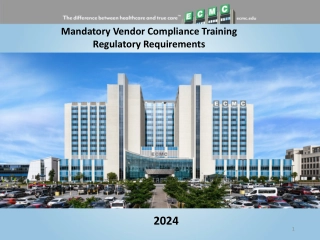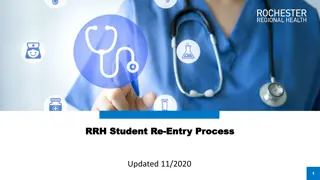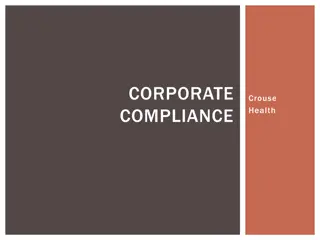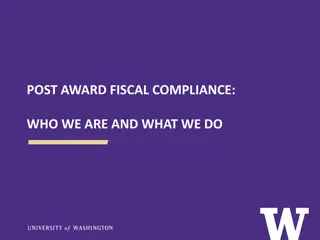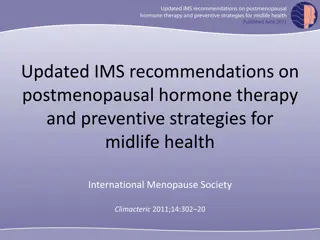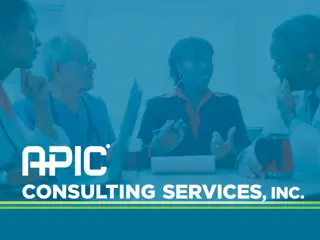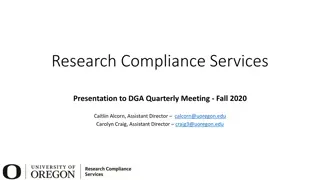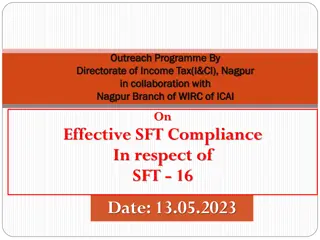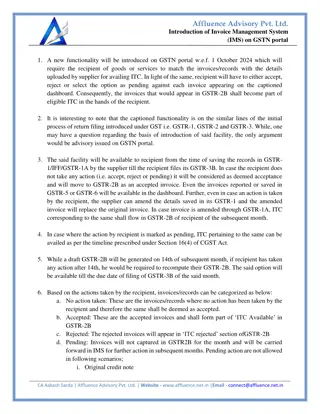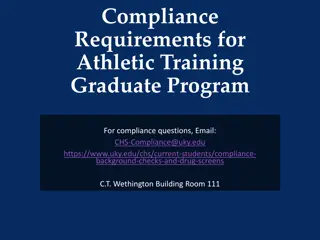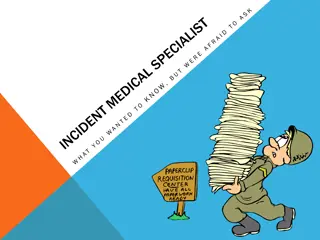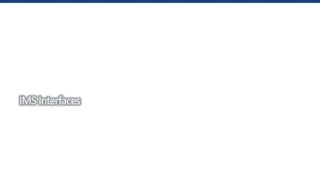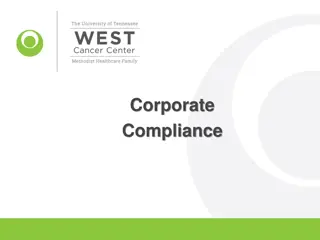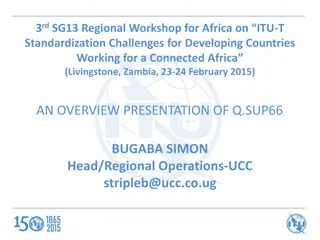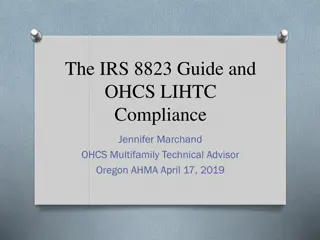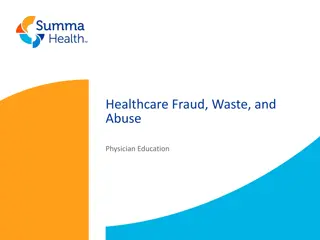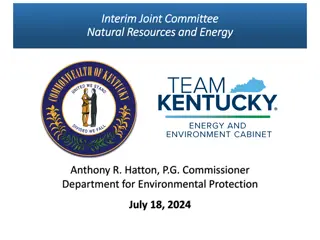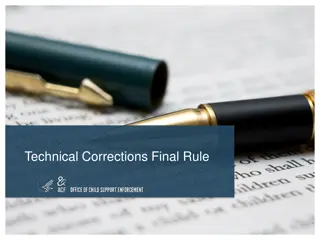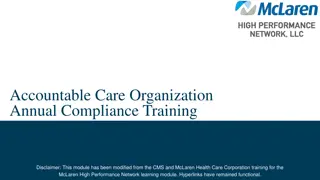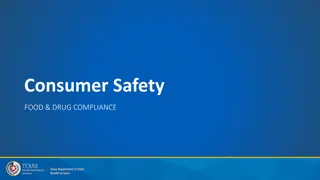
Preventing Noncompliance: Family Choice Compliance Program Overview
Learn about Family Choice Compliance Program, its components, the importance of compliance training, and key objectives. Understand fraud, waste, and abuse (FWA) in healthcare to ensure adherence to regulations and reporting procedures in the program.
Download Presentation

Please find below an Image/Link to download the presentation.
The content on the website is provided AS IS for your information and personal use only. It may not be sold, licensed, or shared on other websites without obtaining consent from the author. If you encounter any issues during the download, it is possible that the publisher has removed the file from their server.
You are allowed to download the files provided on this website for personal or commercial use, subject to the condition that they are used lawfully. All files are the property of their respective owners.
The content on the website is provided AS IS for your information and personal use only. It may not be sold, licensed, or shared on other websites without obtaining consent from the author.
E N D
Presentation Transcript
Compliance Program Family Choice s ( FC ) Compliance Program is its first line of defense for preventing, detecting, and correcting noncompliance. Family Choice s Compliance Plan includes: A designated Compliance Officer who is not legal counsel to FC and reports directly to FC s governing body, Written policies, procedures, and standards of conduct, to comply with all applicable Federal and State regulations, Mechanisms for identifying and addressing compliance issues related to operations and performance, A method for FC employees, contractors, providers/suppliers to anonymously report suspected problems related to FC to the Compliance Officer, Compliance training for FC and its providers/suppliers, Requirements for reporting violations of law to appropriate law enforcement agencies, and Effective system for routine monitoring, auditing, and identifying compliance risks.
Compliance Training Compliance training is important to the integrity of the Centers for Medicare and Medicaid s ( CMS ) Medicare Shared Savings Program and is required of all FC providers. This training provides FC and its providers with information regarding applicable laws and policies regarding detecting and preventing fraud, waste, and abuse related to federally funded government programs such as Medicare, in addition to other compliance risks specific to FC. Please make sure to sign in on the sign-in sheet. Thank you.
Objectives After completion of this Compliance Training, you should be able to: Recognize Fraud, Waste, and Abuse ( FWA ) Identify major FWA laws and regulations Understand compliance risk areas Identify methods to report FWA
Fraud, Waste, and Abuse Fraud Knowingly submitting, or causing to be submitted, false claims or making misrepresentations of fact to get a federal health care payment when no entitlement would otherwise exist. Knowingly soliciting, getting, offering, or paying remuneration (i.e., kickbacks, bribes, or rebates) to induce or reward referrals for items or services reimbursed by federal health care programs. Making prohibited referrals for certain designated health services. Fraud requires intent to get payment and knowledge that the actions are wrong.
Fraud, Waste, and Abuse Examples of Fraud Knowingly billing for services of higher complexity than services actually provided or documented in patient medical records. Knowingly billing for services or supplies not provided, including falsifying records to show item delivery. Knowingly ordering medically unnecessary patient items or services. Paying for federal health care program patient referrals. Billing Medicare for appointments patients don t keep.
Fraud, Waste, and Abuse The Criminal Health Care Fraud Statute (18 USC 1347) makes it a criminal offense to knowingly and willfully execute a scheme to defraud a health care benefit program. (Question 1) Health care fraud is punishable by imprisonment up to 10 years and also subject to criminal fines up to $250,000. Example: Several doctors and medical clinics conspire in a coordinated scheme to defraud the Medicare Program by submitting medically unnecessary power wheelchair claims.
Fraud, Waste, and Abuse Waste Overutilization of services or other practices that, directly or indirectly, result in unnecessary Medicare Program costs. Generally due to the misuse of resources rather than caused by criminally negligent actions. Examples (Question 2) Conducting excessive office visits or writing excessive prescriptions. Prescribing more medications than necessary for treating a specific condition. Ordering excessive lab tests.
Fraud, Waste, and Abuse Abuse Practices that, directly or indirectly, result in unnecessary Medicare Program costs, including practices that do not provide patients with medically necessary services or meet professionally recognized standards of care. Examples Billing unnecessary medical services. Charging excessively for services or supplies. Misusing codes on a claim, like upcoding (assigning an inaccurate medical procedure or treatment billing code to increase payment) or unbundling codes.
Federal Civil False Claims Act (FCA) The civil FCA (31 USC 3729-3733) makes a person liable to pay damages to the government if they knowingly: Conspire to violate the FCA Carry out other acts to get government property by misrepresentation Conceal or improperly avoid or decrease an obligation to pay the government Make or use a false record or statement supporting a false claim Present a false claim for payment or approval Under the criminal FCA (18 USC 287), individuals or entities may face criminal penalties, including fines, imprisonment, or both for submitting false, fictitious, or fraudulent claims.
Federal Civil False Claims Act (FCA) Under the FCA, whistleblowers can expose information or activity that is deemed illegal, dishonest, or violates professional or clinical standards. A person who reports false claims or brings legal actions to recover money paid on false claims is protected from retaliation. A person who brings a successful whistleblower lawsuit can receive at least 15%, but not more than 30%, of the money the government collects.
Anti-Kickback Statute (AKS) The AKS (42 USC 1320a-7b(b)) makes it a crime to knowingly and willfully offer, pay, solicit, or get any remuneration directly or indirectly to induce or reward patient referrals or business generation involving any item or service payable by a federal health care program. Simply put, it prohibits directly or indirectly offering or receiving anything of value in exchange for/to induce referrals. CMS has developed safe harbor regulations (42 CFR 1001.952) that specify payment and business practices that are not considered kickbacks/bribes, should they meet regulatory requirements. Violations are punishable by a fine up to $25,000, imprisonment up to 5 years, or both.
Physician Self-Referral Law (Stark) The Physician Self-Referral Law or Stark Law (42 USC 1395nn) prohibits a physician from referring a patient to get designated health services from a provider with whom a physician or physician s immediate family member has a financial relationship, unless an exception applies. (Question 3) Designated health services include clinical lab services, PT/OT/outpatient SLP services, radiology/imaging services, DME and supplies, prosthetics, orthotics and supplies, home health services, outpatient prescription drugs, inpatient/outpatient hospital services CMS will not pay Medicare claims tainted by an arrangement that violates Stark Law. Penalties of $25,000 can be imposed for each service provided, along with a potential fine of $160,000 for entering into an unlawful arrangement.
Exclusion Statute The Exclusion Statute (42 USC 1320a-7) requires the Office of Inspector General ( OIG ) to exclude individuals and entities convicted of the following offenses from participating in all federal health care programs: Medicare or Medicaid fraud Patient abuse or neglect Felony convictions for other health care-related fraud, theft, or other financial misconduct Felony convictions for unlawful manufacture, distribution, prescribing, or dispensing controlled substances. Family Choice cannot employ, pay, or contract with any excluded individual or entity.
Civil Money Penalties Law (CMPL) The CMPL (42 USC 1320a-7a) authorizes the OIG to seek civil monetary penalties ( CMPs ) and sometimes exclusions, for a variety of health care fraud violations. Violations that may justify CMPs include: Filing a claim you know or should know is for an item/service that wasn t provided as claimed or is false or fraudulent Violating the Anti-Kickback Statute Providing false or misleading information expected to influence a discharge decision Failing to provide an adequate medical screening exam for patients who present to a hospital ED with an emergency medical condition or in labor Making false statement or misrepresentations on applications or contracts to participate in federal health care programs.
Compliance Risk Areas Medicare Enrollment Beneficiary Rights and Protections Beneficiary Outreach and Marketing Health Insurance Portability and Accountability Act (HIPAA)
Medicare Enrollment (ACO) Family Choice ACO s Participant providers must have a Medicare- enrolled billing taxpayer identification number ( TIN ). (42 CFR 425.20) Ensure that you maintain enrollment in CMS Provider Enrollment, Chain, and Ownership System ( PECOS ) and monitor and review your Medicare enrollment status.
Beneficiary Rights and Protections (ACO) Beneficiary Freedom of Choice CMS requires that Medicare beneficiaries maintain freedom of choice. Family Choice may not adopt policies that inhibit beneficiaries from exercising their right to obtain services from any Medicare provider. Opt-out Data Sharing CMS requires that Family Choice honor a beneficiary s request to opt out of data sharing. Family Choice must notify CMS if any beneficiary communicates their desire to opt out of data sharing (or to opt back in).
Beneficiary Outreach and Marketing CMS regulates FC s marketing and outreach communications with beneficiaries. Marketing materials and activities include, but are not limited to, general audience materials such as brochures, advertisements, outreach events, beneficiary letters, webpages, data sharing opt out letters, mailings, social media, or other activities conducted by or on behalf of FC, or by FC participants, providers/suppliers, when used to educate, solicit, notify, or contact Medicare beneficiaries or providers/suppliers regarding the Shared Savings Program. Generally, CMS requires that all marketing materials, with the exception of CMS templates, be submitted for CMS review before use. Family Choice cannot use materials, language, and activities in a discriminatory manner or purpose, and the content cannot be materially inaccurate or misleading. Family Choice should be provided with any proposed marketing materials prior to use or distribution to ensure compliance with CMS requirements.
Health Insurance Portability and Accountability Act (HIPAA) Family Choice and its providers have access to protected health information ( PHI ) and must comply with HIPAA. PHI includes information that relates to an individual s past, present, or future physical or mental health or condition; the provision of health care to the individual; the past, present, or future payment for the provision of health care to the individual. Under HIPAA, FC and its providers must obtain the patient s written authorization for any use or disclosure of PHI that is not for treatment, payment, or health care operations or otherwise permitted or required by the HIPAA Privacy Rule. (Question 4)
Health Insurance Portability and Accountability Act (HIPAA) Family Choice and its providers must comply with the HIPAA Privacy and Security rules and must abide by the terms contained within the CMS ACO Participation Agreement and Business Associate Agreement. This includes: Minimum Necessary: Family Choice and its providers must make reasonable efforts to use and disclose only the minimum amount of PHI necessary to accomplish the intended purpose of the use or disclosure. (Question 5) Breach Notification: Family Choice and its providers must provide notice of any breach of PHI. If it is suspected that PHI has been inappropriately accessed, used or disclosed, it must be reported immediately to FC s Compliance Hotline.
Case Studies In September 2018, Raley s experienced a data breach affecting 10,000 pharmacy customers after an employee s laptop was stolen. The company responded quickly to notify authorities, the press, and the people affected and has since added encryption to all laptops. In 2023, a phishing campaign targeted Microsoft account holders by sending fraudulent messages regarding unusual sign-in activity. The subject line of these phishing emails was RE: Microsoft account unusual sign-in activity and they claimed to have detected unusual sign-in activity on the recipient s Microsoft account. The emails provided details of the alleged sign-in, such as the country/region, IP address, date, platform and browser. To address this supposed security concern, the phishing emails urged recipients to review their recent activity by clicking on a provided link which led to malicious websites unrelated to Microsoft. The emails and links were designed to steal user credentials or personal information, or to download malicious content onto the user s device.
How to Report Compliance Concerns Reports of suspected or actual non-compliance or FWA concerns can be reported to Family Choice s Compliance Department using the following methods: Confidential Compliance Hotline: 1-800-314-0407 Reports to this number can be made anonymously. Email: ACOCompliance@familychoice.com In accordance with Family Choice s non-retaliation policy, there will be no retaliation against you for reporting suspected non-compliance in good faith. Family Choice is required to report violations or probable violations to the appropriate law enforcement agencies, including CMS.

